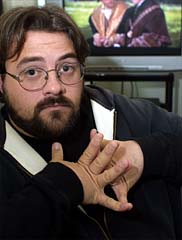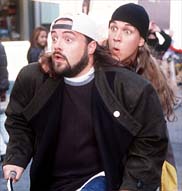The New York Times - Watching Movies with Kevin Smith
July 20, 2001
WATCHING MOVIES WITH KEVIN SMITHThe Thrill Is Just TalkBy RICK LYMAN
 |

Monica Almeida/The New York Times The director Kevin Smith gears up to watch the 1966 film "A Man for All Seasons," starring Orson Welles and Paul Scofield.
|
 |
 |  | 'A Man for All Seasons': A Sturdy Conscience, a Steadfast Heart (Dec. 13, 1966)
Watching Movies With...
Julianne Moore (June 15, 2001)
Michael Bay (May 18, 2001)
Harvey Weinstein (April 27, 2001)
Wolfgang Petersen (March 30, 2001)
Ang Lee (March 9, 2001)
Steven Soderbergh (Feb. 16, 2001)
Kevin Costner (Jan. 19, 2001)
Curtis Hanson (Dec. 15, 2000)
Ron Howard (Nov. 3, 2000)
Janusz Kaminski (Oct. 6, 2000)
Quentin Tarantino (Sept. 15, 2000)
|  |  |  |
 |
 |  | Join a Discussion on Movies
|  |  |
 |

Tracy Bennet/Dimension Films Kevin Smith, left, and his co-star Jason Mewes in "Jay and Silent Bob Strike Back," Mr. Smith's latest sex-and-drugs comedy.
|
 OS ANGELES -- Words, words, words. They come spilling out of "A Man for All Seasons" in great torrents that spin and swell into rapids, a furious river of words. And Paul Scofield wraps his dour face and deep-timbred voice around Robert Bolt's dialogue with such satisfying, calculated calibration. OS ANGELES -- Words, words, words. They come spilling out of "A Man for All Seasons" in great torrents that spin and swell into rapids, a furious river of words. And Paul Scofield wraps his dour face and deep-timbred voice around Robert Bolt's dialogue with such satisfying, calculated calibration.
Kevin Smith laughed and nodded his head. "This language, it's so great," he said, leaning back again in a swivel chair in his baby-blue bungalow on the CBS Studio Center lot, where he is finishing the editing on "Jay and Silent Bob Strike Back," his latest sex- and-drugs comedy. In one scene, Mr. Scofield, playing the soon-to-be-martyred Sir Thomas More in Henry VIII's England, argues with his sanctimonious son-in-law over the importance of laws. Will Roper, the son-in-law, wants to cut down any laws that get in the way of defeating the devil's work. "And when the last law was cut down and the devil turned round on you, where would you hide, Roper, the laws all being flat? This country is planted thick with laws, from coast to coast - man's laws, not God's - and if you cut them down, and you're just the man to do it, do you really think you could stand upright in the winds that would blow then?" Mr. Scofield pauses for just a beat. "Yes," he continues, "I give the devil benefit of law for my own safety's sake." Mr. Smith's comfortably cluttered bungalow is a stone's throw from Ventura Boulevard and just across a concrete canal from the fenced-in compound where production is under way on the latest installment of the network's "Big Brother" reality series. People on the lot have been warned to steer clear of the compound and not tell anyone where it is. It's a big secret. "The dialogue in this movie - it pops, you know," Mr. Smith said, snapping his fingers. "Back and forth and back and forth. And let's face it, this is a movie that's pretty much all dialogue." To Mr. Smith, that's the greatest pleasure, seeing how dramatic momentum can come not from action but from the interplay of words and ideas. "Actually, that's what I try to do in my movies," he said. "That's all I'm good at. I don't even think I try to do it; it's just the only thing I can do. I'm terrible at action, but pretty decent at dialogue. And I always thought that this movie had a lot to do with why I write the way I write. Because this is such a definitive film for me. Lord knows, I love popcorn movies as much as the next guy. The 'Star Wars' films were a huge part of my life. But this is one of the first movies that introduced me to the notion of dialogue and character and nothing else really needing to happen." Mr. Smith, 30, knows he might seem an uneasy fit for the director Fred Zinnemann's dense drama of ideas and intellectual heroism. Beginning with "Clerks" (1994), a witty and ragtag story about young men working dead-end jobs in a New Jersey strip mall, Mr. Smith has earned a reputation for a kind of cheerful, pop-infused vulgarity that snaps with self-deprecating wit. But while he stresses that he does not claim to be the equal of either Zinnemann or Bolt, he does feel a kind of kinship between their work and his quick- bantering comedies of male immaturity, which reside, as he puts it, in a world of jokes about genitalia and flatulence. "'A Man for All Seasons' has some beautiful scenes in it, but it is not a visually stunning film," Mr. Smith said. "I only wish I were talented enough to pull off a really talky film that's not visually stunning but still gets the job done. All the flicks I've done, people are always going, `Wow, he's not a really good visual stylist - his films tend to be about dialogue.' Well, this film is all about dialogue, too, but nobody ever calls Zinnemann on the fact that it's not visually popping because he's so skillful that he's able to tell the story in a way that, despite all the dialogue, it doesn't feel static. I wish I could do that." Thanks to Sister Theresa The short, thick, bearded Mr. Smith is familiar to moviegoers for the small parts he plays in his own films. (In his latest one, he is the wordless Silent Bob to his co-star Jason Mewes's motormouth Jay.) And as he moved through the suite of offices and into the editing room to watch "A Man for All Seasons," he looked very much like Silent Bob, right down to the doleful eyes and the backward baseball cap. Once in the editing room, the door closed and the DVD slid into the bank of technical gizmos, he pulled out a pack of cigarettes and began to snap it loudly on his forearm. "Why this movie?" he asked as he watched the credits roll. "It's been a favorite of mine since I was a kid. The first time I saw it was when I was about 13. It would have been 1983. I watched it because I was going to a Catholic school in Jersey at the time, Our Lady of Perpetual Help. I had this teacher, Sister Theresa, who was great, and Thomas More was her favorite saint and she loved this movie. For our eighth- grade production one year, she did an adaptation of Bolt's stage play for us to perform. She chopped out a lot, but we still put it on. I played Cromwell. She picked a guy in the class to play Henry VIII because he had red hair. She was kind of fanatical about the details." Sister Theresa encouraged her class to watch the film when it was broadcast on a local television station, to introduce them to the story and prepare for the class production. "I watched it and I just fell in love with it in general," Mr. Smith said. "Even though it was on television and interrupted by commercials, it knocked me out. I don't know why Sister Theresa loved it so much. I think it had something to do with the integrity of More. He wasn't one of these fanatical kind of martyrs who wanted to die on the sword. He was a lawyer and tried like mad to get out of dying but in the end found no way that didn't involve violating his faith. But for me, I loved it just because it was so well-spoken and yet incredibly spiritual at the same time. Here's a dude who held one of the highest offices in England at the time but was still able to maintain his faith." Mr. Smith said his family had just bought its first videocassette recorder, and he made a copy of "A Man for All Seasons" and watched it at least 10 more times in the next weeks. "It got to the point where my parents were, like, 'C'mon, move on, watch something else,' " Mr. Smith said. "But I didn't want to. It was the language. It was the story. It was being 13 years old and admiring somebody who was able to go down for God. Maybe I even felt I could identify with Thomas More a bit. I can appreciate the way More's mind worked, how he was able to juggle the two worlds of the spiritual and the everyday. I mean, it's easy to say we don't want to sin, but it's very hard not to sin. Here's a dude who found a way to do it, to walk the line."
|
|
|
|













